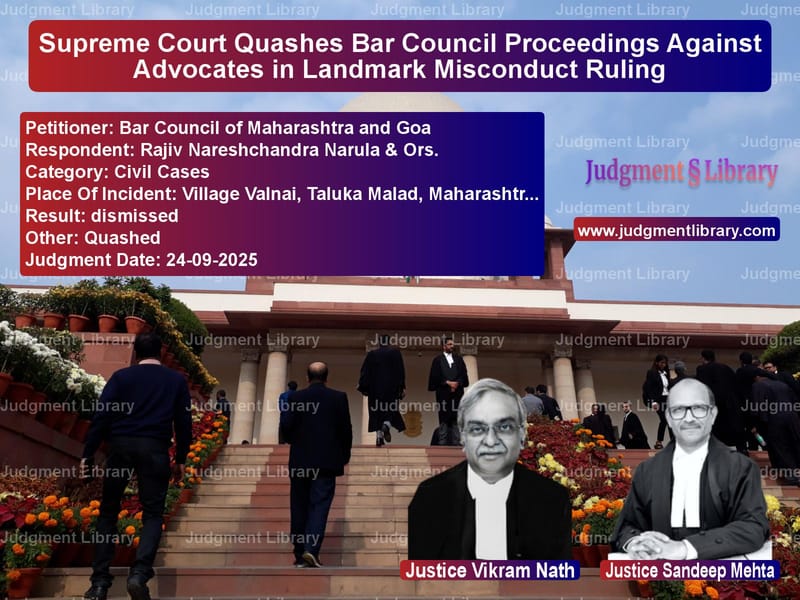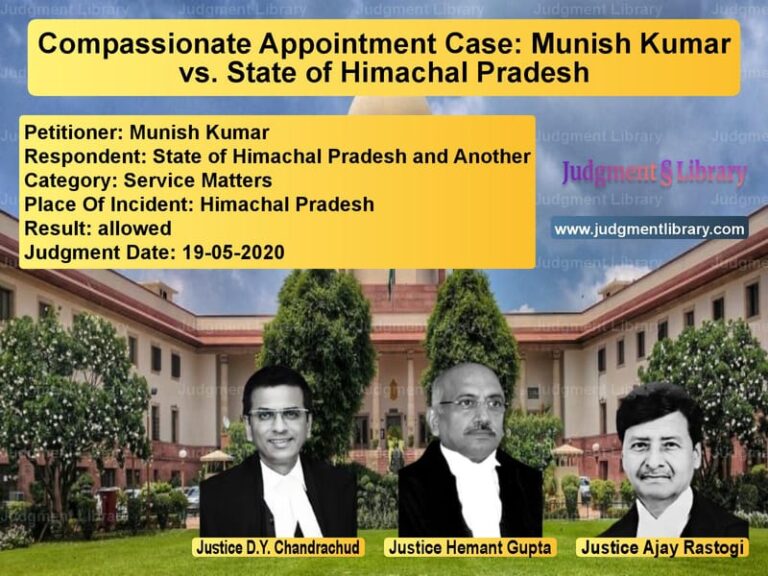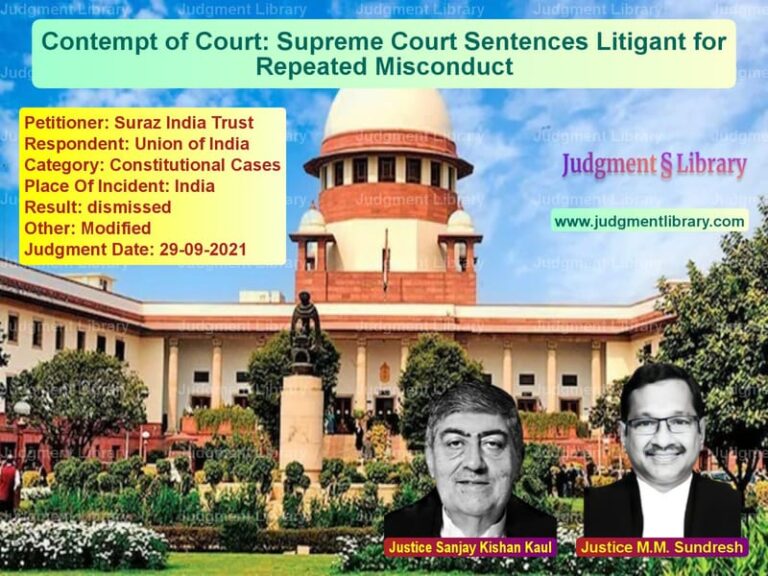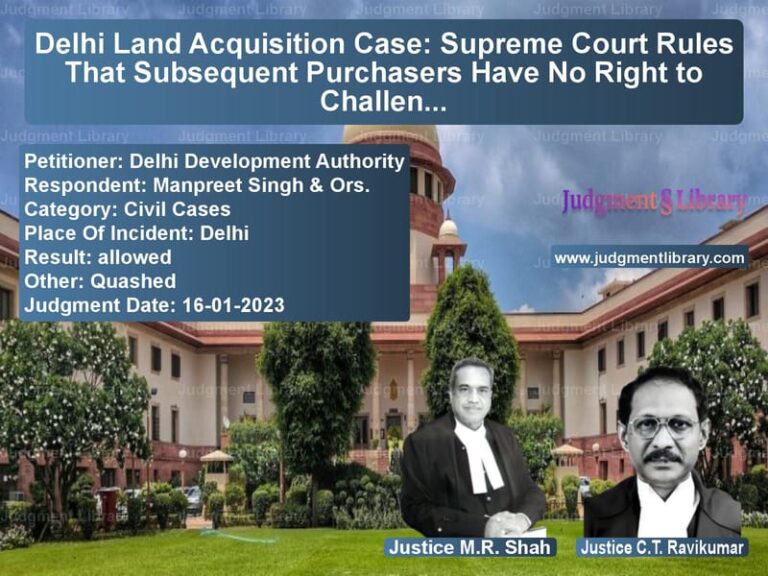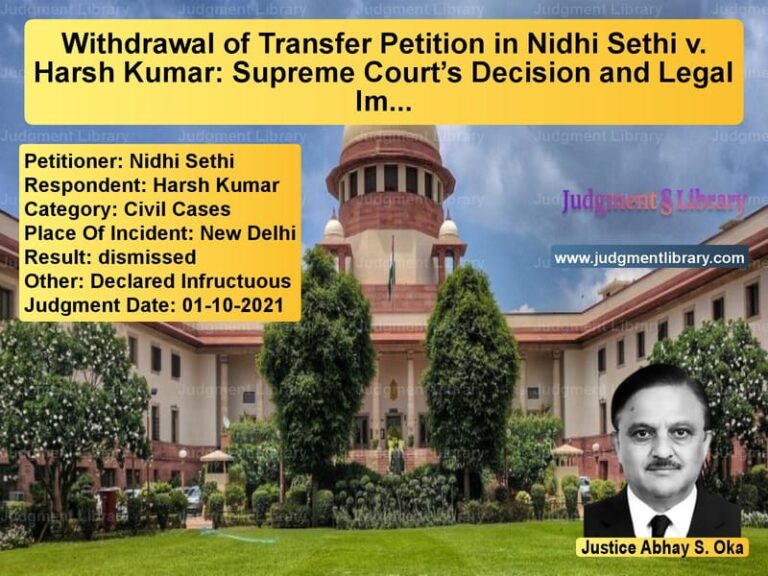Supreme Court Quashes Bar Council Proceedings Against Advocates in Landmark Misconduct Ruling
In a significant judgment that clarifies the boundaries of professional misconduct proceedings against advocates, the Supreme Court of India recently delivered a ruling that protects lawyers from frivolous complaints filed by opposing parties in litigation. The case involved appeals from the Bar Council of Maharashtra and Goa challenging High Court orders that had stayed disciplinary proceedings against advocates.
The central issue before the Court was whether disciplinary proceedings could be initiated against advocates based on complaints filed by opposing litigants with whom the advocates had no professional relationship. The Supreme Court’s answer was a resounding no, establishing important safeguards for legal professionals against malicious complaints.
The First Case: Rajiv Narula’s Ordeal
The first matter involved Advocate Rajiv Nareshchandra Narula, against whom a complaint had been filed by Khimji Devji Parmar. The complaint originated from a property dispute that dated back several decades. Parmar claimed to be an heir to Devji Parmar, who was allegedly a partner in M/s. Volga Enterprises. The firm had some connection to a piece of land in Village Valnai, Taluka Malad.
The heart of Parmar’s complaint was that during the pendency of a suit before the Bombay High Court, Consent Terms were arrived at between M/s. Unique Construction and Nusli Randelia without the knowledge of Dara Nariman Sarkari, who Parmar claimed was a necessary party. Advocate Rajiv Narula had merely identified the authorized representative of M/s. Unique Construction in these Consent Terms.
Parmar alleged that Advocate Narula had suppressed material facts from the High Court and was complicit in fraudulent transactions that deprived the legal representatives of Dara Nariman Sarkari and Devji Parmar of their rightful share in the property. Based on this complaint, the Judge-Advocate of the Bar Council of Maharashtra and Goa passed an order on July 6, 2023, referring the matter to the Disciplinary Committee.
The Bar Council’s Arguments
Learned counsel representing the appellant-Bar Council vehemently and fervently contended that the challenge laid to the cognizance order was premature and the High Court ought not to have entertained the writ petition filed by the respondent-advocate against the interlocutory order of reference passed by the Judge-Advocate of the Bar Council on the valid complaint filed by Khimji Devji Parmar.
It was submitted that at the stage of taking cognizance of a complaint, detailed reasons are not required, and a prima facie finding in the reference order that there are grounds to proceed against the advocate for misconduct would be sufficient for reference of the complaint to the DC. Furthermore, the orders passed by the State Bar Council are amenable to challenge before the Bar Council of India.
Read also: https://judgmentlibrary.com/supreme-court-upholds-landowner-rights-in-haryana-bachat-land-case/
He thus urged that the High Court committed patent jurisdictional error in entertaining the writ petition filed by the respondent-advocate against the reference order and granting a stay on the proceedings before the DC.
The Advocate’s Defense
Per contra, learned counsel representing the respondent-advocate fervently contended that the complaint filed by Shri Khimji Devji Parmar is, ex facie, mala fide and malicious.
The respondent had admittedly not represented the complainant and thus, entertaining a complaint filed against the advocate of the opposite party is nothing short of a gross abuse of the process of law.
It was submitted that till date, there is no order recalling or rescinding the disputed consent terms recorded in the original suit proceedings, and thus, the complaint lacks foundation. Hence, the High Court was justified in entertaining the writ petition and granting a stay on further proceedings.
It was further urged that the order dated 6th July, 2023, whereby the complaint was referred to the DC, does not refer to even the barest of allegations set out in the complaint filed against the respondent-advocate, and only a cryptic satisfaction has been recorded that the complainant has made out a case for invoking jurisdiction under Section 35 of the 1961 Act. When a regulatory body like the Bar Council intends to proceed for professional misconduct against an enrolled advocate, then it is essential that at least a bare minimum discussion of allegations set out in the complaint is made before referring the complaint to the DC.
The Supreme Court’s Reasoning
After hearing both sides and examining the records, the Supreme Court delivered a powerful judgment quashing the disciplinary proceedings. The Court made several crucial observations that establish important precedents for professional misconduct cases against advocates.
The Court noted: “It is an admitted case of the parties that the respondent-advocate never represented Nusli Randelia, Dara Sarkari, or M/s. Volga Enterprises in the suit before the High Court. The respondent-advocate had simply identified the plaintiff being the authorized representative of M/s. Unique Construction in the Consent Terms, which stand undisturbed to date. Thus, by mere identification of the plaintiff, the respondent-advocate cannot be held liable to face proceedings under Section 35 of the 1961 Act.”
The Court emphasized the importance of the professional relationship between the complainant and the advocate: “Since the respondent-advocate was not representing the complainant or his predecessor Devji Parmar, there was no justification behind his arraignment in the complaint for alleged misconduct within the meaning of Section 35 of the 1961 Act.”
In a significant clarification of the law, the Court stated: “We say so for the reason that there existed no professional relationship between the respondent-advocate and the complainant. His prosecution, as being the lawyer of the opposite party in the suit before the High Court, was highly objectionable, totally impermissible, and absolutely uncalled for. Ordinarily, the existence of a jural relationship between the complainant and the advocate concerned is a precondition for the invocation of disciplinary jurisdiction on the ground of ‘professional misconduct’.”
The Court also found serious flaws in the Bar Council’s order referring the complaint to the Disciplinary Committee: “In the present case, the order passed supra by the Judge-Advocate, referring the complaint to the DC, is absolutely cryptic and laconic for it does not record any satisfaction to the effect that the respondent-advocate had committed misconduct as provided under Section 35 of the 1961 Act. The order dated 6th July, 2023, does not even make a bald reference to the gist of allegations as set out in the complaint and hence, the same suffers from total non-application of mind.”
The Court highlighted the serious consequences of disciplinary proceedings: “Reference of a complaint of the DC would have serious consequences on the professional career of the lawyer and could tarnish his image and standing in the profession. Hence a cryptic order referring the complaint to the DC without a bare minimum discussion of the allegations contained in the complaint would not satisfy the requirements of a valid reference order.”
The Connected Case
The Supreme Court also dealt with a connected matter involving Advocate Geeta Ramanugrah Shastri. In this case, the complainant Bansidhar Annaji Bhakad had filed a disciplinary complaint alleging that Advocate Shastri, by identifying the deponent of an affidavit filed in court proceedings, had attested to the correctness of the contents of that affidavit.
The complainant alleged that since the statements in the affidavit were ultimately found to be false, the advocate who identified the deponent should be equally responsible for offences of forgery, perjury, or cheating. The High Court had quashed these proceedings, and the Supreme Court affirmed this decision.
The Supreme Court observed: “An advocate, by mere attestation of the affidavit, does not become a privy to the contents of the affidavit. Hence, ex facie, the complaint filed by the petitioner, Bansidhar Annaji Bhakad, against the respondent-advocate was not only bereft of substance but was also founded on malicious and spiteful insinuations directed against the advocate who merely identified the opposite party in an affidavit.”
The Court strongly condemned the Bar Council’s action in this case as well: “The steps taken and order passed by the BCMG in directing registration of the complaint and in referring the same to the DC for undertaking the inquiry were illegal on the face of the record, bordering on perversity. It is manifestly a case of malicious prosecution of the advocate at the behest of the opponent litigant.”
Conclusion and Costs
In both cases, the Supreme Court not only quashed the disciplinary proceedings but also imposed costs of Rs. 50,000 each on the Bar Council of Maharashtra and Goa and the complainants. The costs were to be deposited with the Registry of the Bombay High Court and then paid to the aggrieved advocates.
This judgment serves as a significant protection for advocates against frivolous complaints filed by disgruntled litigants from the opposing side. It establishes that merely representing one party in litigation does not make an advocate liable to disciplinary proceedings from the opposing party, absent a professional relationship between them.
The Supreme Court’s ruling reinforces the principle that disciplinary mechanisms should not be weaponized by litigants to harass opposing counsel. It also sets standards for Bar Councils to follow when considering complaints against advocates, requiring proper application of mind and recording of reasons before referring matters to Disciplinary Committees.
This judgment will likely have far-reaching implications for professional misconduct proceedings against advocates across India, ensuring that the disciplinary process is not misused while maintaining the dignity and integrity of the legal profession.
Petitioner Name: Bar Council of Maharashtra and Goa.Respondent Name: Rajiv Nareshchandra Narula & Ors..Judgment By: Justice Vikram Nath, Justice Sandeep Mehta.Place Of Incident: Village Valnai, Taluka Malad, Maharashtra.Judgment Date: 24-09-2025.Result: dismissed.
Don’t miss out on the full details! Download the complete judgment in PDF format below and gain valuable insights instantly!
Download Judgment: bar-council-of-mahar-vs-rajiv-nareshchandra-supreme-court-of-india-judgment-dated-24-09-2025.pdf
Directly Download Judgment: Directly download this Judgment
See all petitions in Legal Malpractice
See all petitions in Judgment by Vikram Nath
See all petitions in Judgment by Sandeep Mehta
See all petitions in dismissed
See all petitions in Quashed
See all petitions in supreme court of India judgments September 2025
See all petitions in 2025 judgments
See all posts in Civil Cases Category
See all allowed petitions in Civil Cases Category
See all Dismissed petitions in Civil Cases Category
See all partially allowed petitions in Civil Cases Category

